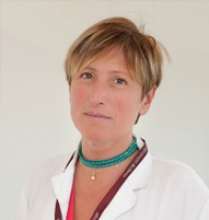Prof. Monica Povedano
Medical Degree by the University of Barcelona in 1994; Title of specialist in Neurophysiology in 1998. Master in Research and Medical Sciences (Hospital Clínic, Barcelona) in 2012.
Awarded by the Barcelona Medical College in 2017 for the professional excellence activity; expert in neuromuscular diseases.
Head of the department of Neurophisyiology in Bellvitge Hospital. Tutor of residents until 2019. Teacher in postgraduate course in EMG and neuromuscular disorders in The University of Barcelona
Coordinator of the Motor Neuron Functional Unit of the Service of Neurology at the Bellvitge University Hospital, Institute of Biomedical Research of Bellvitge (IDIBELL) since 2011.
The motor neuron functional unit treats patients with ALS, SMA and other neurodegenerative motor neuron diseases. The multidisciplinary clinical team includes specialists in pneumology, neurology, rehabilitation, physical therapy, nutrition, psychology, social work and occupational therapy.
The unit led by Dr. Povedano is a reference center for motor neuron pathology in the autonomous community and the state, and it is an expert center in intrathecal treatment of adult SMA.
Dr Povedano is in the board of the European network TRICALS focus on the validation of ALS biomarkers, and new clinical trials. Clinical research of Dr. Povedano has been dedicated to:
- Personalization of ALS phenotypes, adapting validated tools such as the ALS-CBS test and possible interferences for cognitive deterioration in patients, and applying genetic and molecular studies.
- Characterization the functional alterations and application of therapeutic tools to minimize limitations related to swallowing and nutrition in specific subgroups of ALS
- Evaluation of the quality of life at advanced and terminal stages of the disease, studying the relationship between quality of life and disease progression as well as the impact of respiratory difficulties; and improving medical, personal and social environmental factors to minimize suffering.
- Analysis of environmental epidemiological risk factors in the pathogenesis of ALS
- Participation in the analysis of new putative biomarkers of diseases ALS /SMA in blood and CSF
- Coordination of CuidAME: focus on a longitudinal register data of SMA patients, it is an harmonised structure allowing the transfer of data (in anonymised form) with other national and international registers. A prospective monitoring of SMA patients is expected to lead to a better understanding of the natural history of SMA and the influence of drug treatments.

